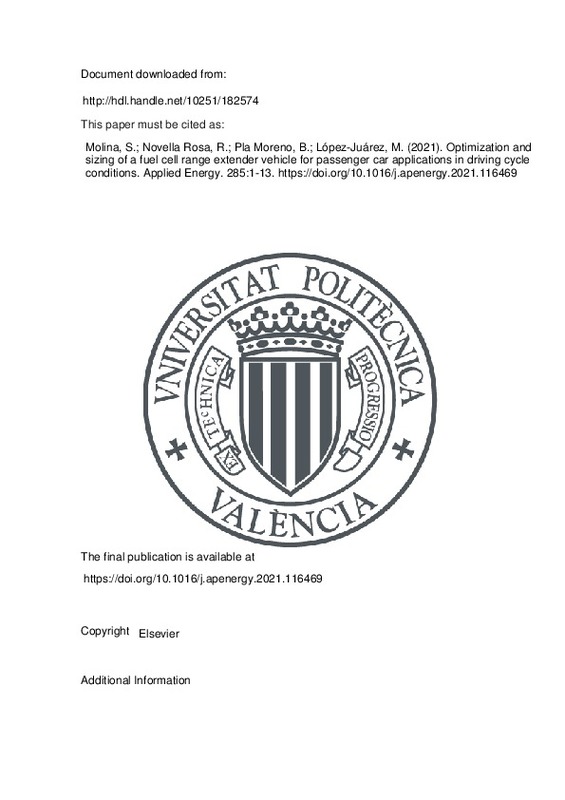JavaScript is disabled for your browser. Some features of this site may not work without it.
Buscar en RiuNet
Listar
Mi cuenta
Estadísticas
Ayuda RiuNet
Admin. UPV
Optimization and sizing of a fuel cell range extender vehicle for passenger car applications in driving cycle conditions
Mostrar el registro sencillo del ítem
Ficheros en el ítem
| dc.contributor.author | Molina, Santiago
|
es_ES |
| dc.contributor.author | Novella Rosa, Ricardo
|
es_ES |
| dc.contributor.author | Pla Moreno, Benjamín
|
es_ES |
| dc.contributor.author | López-Juárez, Marcos
|
es_ES |
| dc.date.accessioned | 2022-05-12T18:06:50Z | |
| dc.date.available | 2022-05-12T18:06:50Z | |
| dc.date.issued | 2021-03-01 | es_ES |
| dc.identifier.issn | 0306-2619 | es_ES |
| dc.identifier.uri | http://hdl.handle.net/10251/182574 | |
| dc.description.abstract | [EN] Aiming to reduce global warming and emissions in general, cleaner technologies are the spotlight of research and industry development. Among them, fuel cell vehicles (FCV) are gaining interest to decarbonize the transport sector. Plug-in FCV or FCV in range-extender configuration (FCREx) is an interesting option to reduce the total cost of ownership (TCO) and the energy usage per km. The aim of this study was to generate design spaces of FCREx by varying the FC stack maximum power output, the battery capacity, and the H-2 tank capacity to understand the implications of this architecture in range, consumption, and cost (estimated with a WLTP driving cycle). Unlike other studies, the approach was focused on a novel architecture for passenger vehicles and was focused on the development of the validated FC system model and the energy management strategy (EMS) optimization for each design, based on the Pontryagin Minimum Principle (PMP). Consumption was found to decrease with increasing battery capacity and FC maximum power due to the higher efficiency of the systems. The design spaces showed how with 5 kg of H-2 and >= 50 kWh of battery capacity the maximum range of FCREx could be over 700 km. The results of this study showed how FCREx architecture could provide overall energy consumption saving up to 6.8% and H-2 consumption saving ranging from 16.8% to 25%, compared to current commercial FCVs. The optimum FCREx design, not only based on performance, should have similar to 30 kWh of battery capacity and >= 80 kW of FC maximum power to minimize manufacturing costs while maximizing efficiency. | es_ES |
| dc.description.sponsorship | This research has been partially funded by FEDER, Spain and the Spanish Government through project RTI2018-102025-B-I00 (CLEANFUEL) and through the University Faculty Training (FPU) program | es_ES |
| dc.language | Inglés | es_ES |
| dc.publisher | Elsevier | es_ES |
| dc.relation.ispartof | Applied Energy | es_ES |
| dc.rights | Reconocimiento - No comercial - Sin obra derivada (by-nc-nd) | es_ES |
| dc.subject | Fuel cell vehicle | es_ES |
| dc.subject | Plug-in | es_ES |
| dc.subject | Range-extender | es_ES |
| dc.subject | Driving cycle | es_ES |
| dc.subject | Sizing | es_ES |
| dc.subject | Optimization | es_ES |
| dc.subject.classification | MAQUINAS Y MOTORES TERMICOS | es_ES |
| dc.title | Optimization and sizing of a fuel cell range extender vehicle for passenger car applications in driving cycle conditions | es_ES |
| dc.type | Artículo | es_ES |
| dc.identifier.doi | 10.1016/j.apenergy.2021.116469 | es_ES |
| dc.relation.projectID | info:eu-repo/grantAgreement/AEI/Plan Estatal de Investigación Científica y Técnica y de Innovación 2017-2020/RTI2018-102025-B-I00/ES/EVALUACION DE LA REDUCCION DE EMISIONES CONTAMINANTES Y CO2 CON EL USO DE COMBUSTIBLES LIMPIOS EN VEHICULOS HIBRIDOS/ | es_ES |
| dc.relation.projectID | info:eu-repo/grantAgreement/ //FPU19%2F00550//AYUDA PREDOCTORAL FPU-LOPEZ JUAREZ. PROYECTO: ANALYSIS OF THE USE OF HYDROGEN IN POWERPLANTS FOR FUTURE TRANSPORT APPLICATIONS/ | es_ES |
| dc.rights.accessRights | Abierto | es_ES |
| dc.contributor.affiliation | Universitat Politècnica de València. Departamento de Máquinas y Motores Térmicos - Departament de Màquines i Motors Tèrmics | es_ES |
| dc.description.bibliographicCitation | Molina, S.; Novella Rosa, R.; Pla Moreno, B.; López-Juárez, M. (2021). Optimization and sizing of a fuel cell range extender vehicle for passenger car applications in driving cycle conditions. Applied Energy. 285:1-13. https://doi.org/10.1016/j.apenergy.2021.116469 | es_ES |
| dc.description.accrualMethod | S | es_ES |
| dc.relation.publisherversion | https://doi.org/10.1016/j.apenergy.2021.116469 | es_ES |
| dc.description.upvformatpinicio | 1 | es_ES |
| dc.description.upvformatpfin | 13 | es_ES |
| dc.type.version | info:eu-repo/semantics/publishedVersion | es_ES |
| dc.description.volume | 285 | es_ES |
| dc.relation.pasarela | S\427197 | es_ES |
| dc.contributor.funder | AGENCIA ESTATAL DE INVESTIGACION | es_ES |
| dc.contributor.funder | European Regional Development Fund | es_ES |
| dc.contributor.funder | MINISTERIO DE UNIVERSIDADES E INVESTIGACION | es_ES |







![[Cerrado]](/themes/UPV/images/candado.png)

